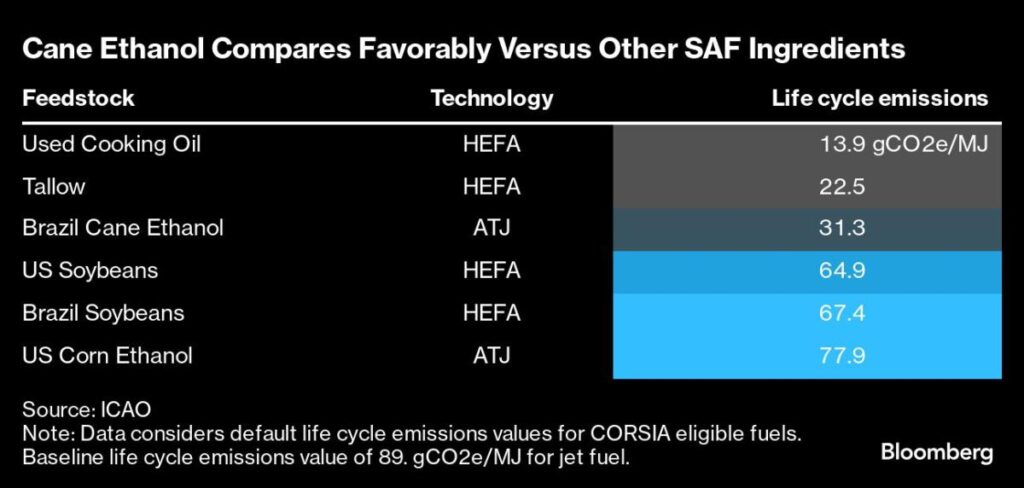(Bloomberg) — A global push to decarbonize air travel has groups from Big Oil to sovereign wealth funds betting on Brazil to become a top global center for green jet fuel.
Most Read from Bloomberg
Brazil is becoming a magnet for investment as countries race to grab a share of what promises to be a fast-growing market, with Shell Plc and Abu Dhabi’s Mubadala Investment Co. considering new sustainable aviation fuel plants in the country. That’s in part because Latin America’s biggest economy is the world’s second-largest producer of ethanol, which can be used to produce SAF.
Agriculture powerhouse Brazil has an abundance of cheap crops to make biofuels, providing the nation a leg up on competitors including the US. Many of Brazil’s supplies also rank better in terms of carbon emissions, key to meeting requirements for SAF production.
“Brazil is in a very privileged position to be the world’s SAF hub,” said Bruno Serapião, chief executive officer of sugar cane group Atvos Agroindustrial SA. The Mubadala-backed company is currently considering investing in an SAF unit that will use the alcohol-to-jet technology, converting ethanol into aviation fuel.
SAF is one of the few pathways the aviation industry has at its disposal to curb its carbon footprint, which accounts for about 2.5% of global emissions. Interest in green jet fuel is picking up, driven by policy support, particularly in the European Union and the US, but demand far exceeds available supply and is forecast to continue growing.
Ricardo Mussa, chief executive officer of sugar and ethanol company Raizen SA, said Brazil’s ethanol production puts it in a strong position to be a major exporter of SAF.
“For every liter of SAF, we need 1.7 liters of ethanol, so the best place to produce would be in the origin, in Brazil,” Mussa said at Bloomberg New Economy at B20 in Sao Paulo last week.
Production of green aviation fuel in Brazil has the potential to reach around 50 billion liters (13.2 billion gallons) by 2030 with further investments in agriculture, according to preliminary data from a study carried out by Airbus, LATAM Airlines Group SA and the Massachusetts Institute of Technology. That’s similar to the US’s potential output, but Brazil is set to be a bigger exporter, with American production being consumed domestically.
Companies and authorities in Brazil expect that SAF made from the country’s ethanol will be more effective than other crop-based alternatives. That’s mainly because of how international standards for cleaning global air travel are being written.
According to data by the International Civil Aviation Organization, Brazilian sugar cane ethanol has lower carbon emissions compared to other SAF ingredients such as soybean oil or US corn-based ethanol. That means Brazilian-produced SAF would likely be more efficient in helping airlines reach targets to reduce their carbon emissions.
“The more demanding the emission reduction plans are, the higher the carbon price, the better positioned Brazil will be,” said Marcelo Moreira, a partner at consultancy Agroicone.
Brazil is already shipping ethanol to US plants that turn it into SAF. Now it wants to make its own aviation fuel plants. Government-backed credit lines and new mandates forcing airlines to decarbonize are helping the industry.
Still, Brazil has to compete with large incentives provided by President Joe Biden’s landmark climate legislation, the Inflation Reduction Act.
“There’s a risk that Brazilian ethanol is going to be exported to be converted into SAF everywhere else in the globe and that we would have to import SAF,” said BP Bioenergy CEO Geovane Consul. Brazil needs to work to ensure that doesn’t happen, he said.
In response to those concerns, President Luiz Inacio Lula da Silva earlier this month approved “Fuel of The Future” legislation that creates broader mandates for biofuels. Projects to boost infrastructure in the country are moving forward at a more rapid pace than some similar US endeavors.
FS Industria de Biocombustiveis Ltda, one of Brazil’s top ethanol producers that is backed by US-based Summit Agricultural Group, this month said it will proceed with a carbon capture project to supply what it claims will be the first negative carbon-emission ethanol. Summit Carbon Solutions, meanwhile, is seeing delays in its carbon-capture and storage pipeline in the US.
Groups that dominate global fuel markets have long established connections with ethanol makers in Brazil.
Raizen, a joint-venture between Shell and Brazil’s Cosan SA, has announced plans to build an alcohol-to-jet plant. Britain’s BP Plc also recently pointed to jet fuel markets as part of its strategy after acquiring shares sold by Bunge Global SA in a former Brazilian ethanol joint venture.
While many Brazilian SAF projects are still in their infancy, equipment supplier Honeywell International Inc. believes about four to five new plants could “come to the market very soon,” said Ken West, the company’s CEO of energy and sustainability solutions.
–With assistance from Ilena Peng.
(Corrects company names in 16th paragraph in story originally published Oct. 31)
Most Read from Bloomberg Businessweek
©2024 Bloomberg L.P.
Read the full article here


